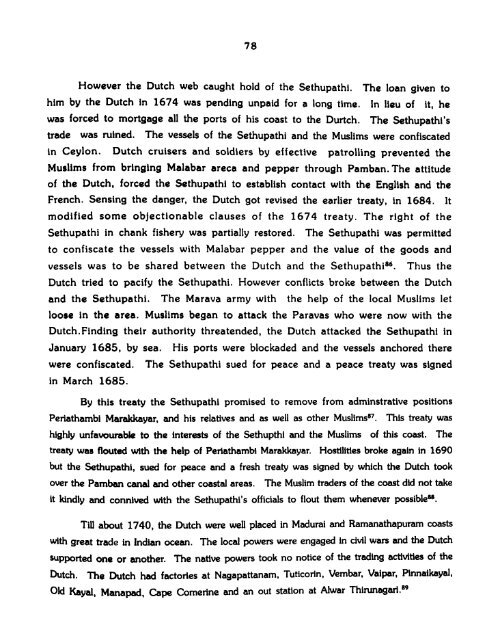maritime activities economy and social customs of the muslims of ...
maritime activities economy and social customs of the muslims of ...
maritime activities economy and social customs of the muslims of ...
Create successful ePaper yourself
Turn your PDF publications into a flip-book with our unique Google optimized e-Paper software.
However <strong>the</strong> Dutch web caught hold <strong>of</strong> <strong>the</strong> Sethupathl. The loan given to<br />
him by <strong>the</strong> Dutch In 1674 was pending unpaid for a long time. In lieu <strong>of</strong> it, he<br />
was forced to mortgage all <strong>the</strong> ports <strong>of</strong> his coast to <strong>the</strong> Durtch. The Sethupathi's<br />
trade was ruined. The vessels <strong>of</strong> <strong>the</strong> Sethupathi <strong>and</strong> <strong>the</strong> Muslims were confiscated<br />
in Ceylon. Dutch cruisers <strong>and</strong> soldiers by effective patrolling prevented <strong>the</strong><br />
Muslims from bringing Malabar areca <strong>and</strong> pepper through Pamban. The attitude<br />
<strong>of</strong> <strong>the</strong> Dutch, forced <strong>the</strong> Sethupathi to establish contact with <strong>the</strong> English <strong>and</strong> <strong>the</strong><br />
French. Sensing <strong>the</strong> danger, <strong>the</strong> Dutch got revised <strong>the</strong> earlier treaty. in 1684. It<br />
modified some objectionable clauses <strong>of</strong> <strong>the</strong> 1674 treaty. The right <strong>of</strong> <strong>the</strong><br />
Sethupathi in chank fishery was partially restored. The Sethupathi was permitted<br />
to confiscate <strong>the</strong> vessels with Malabar pepper <strong>and</strong> <strong>the</strong> value <strong>of</strong> <strong>the</strong> goods <strong>and</strong><br />
vessels was to be shared between <strong>the</strong> Dutch <strong>and</strong> <strong>the</strong> Sethupathis6. Thus <strong>the</strong><br />
Dutch tried to pacify <strong>the</strong> Sethupathi. However conflicts broke between <strong>the</strong> Dutch<br />
<strong>and</strong> <strong>the</strong> Sethupathi. The Marava army with<br />
<strong>the</strong> help <strong>of</strong> <strong>the</strong> local Muslims let<br />
loose in <strong>the</strong> area. Muslims began to attack <strong>the</strong> Paravas who were now with <strong>the</strong><br />
Dutch.Finding <strong>the</strong>ir authority threatended, <strong>the</strong> Dutch attacked <strong>the</strong> Sethupathi in<br />
January 1685, by sea. His ports were blockaded <strong>and</strong> <strong>the</strong> vessels anchored <strong>the</strong>re<br />
were confiscated. The Sethupathi sued for peace <strong>and</strong> a peace treaty was signed<br />
in March 1685.<br />
By this treaty <strong>the</strong> Sethupathi promised to remove from adminstrative positions<br />
Periathambi Marakkayar, <strong>and</strong> his relatives <strong>and</strong> as well as o<strong>the</strong>r Muslimsa7. This treaty was<br />
highly unfawurabk to <strong>the</strong> interests <strong>of</strong> <strong>the</strong> Sethupthi <strong>and</strong> <strong>the</strong> Muslims <strong>of</strong> this coast. The<br />
treaty waa flouted with <strong>the</strong> help <strong>of</strong> Periathambi Marakkayar. Hostilities broke again in 1690<br />
but <strong>the</strong> Sethupathi, sued for peace <strong>and</strong> a fresh treaty was signed by which <strong>the</strong> Dutch took<br />
over <strong>the</strong> Pamban canal <strong>and</strong> o<strong>the</strong>r coastal areas. The Muslim traders <strong>of</strong> <strong>the</strong> coast did not take<br />
it kindly <strong>and</strong> connived with <strong>the</strong> Sethupathi's <strong>of</strong>ficials to flout <strong>the</strong>m whenever possibleM.<br />
Till about 1740, <strong>the</strong> Dutch were well placed in Madumi <strong>and</strong> Ramanathapurarn coasts<br />
with great trade in Indian ocean. The local powers were engaged in civil wars <strong>and</strong> <strong>the</strong> Dutch<br />
supported one or ano<strong>the</strong>r. The native powers took no notice <strong>of</strong> <strong>the</strong> trading <strong>activities</strong> <strong>of</strong> <strong>the</strong><br />
Dutch. The Dutch had factories at Nagapattanam, Tuticorin. Vembar, Vaipar, Pinnaikayai,<br />
Old Kayal, Manapad, Cape Comefine <strong>and</strong> an out station at Ahvar Thi~unagari.~~

















